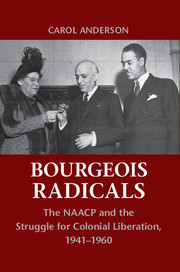Book contents
- Frontmatter
- Dedication
- Contents
- List of Figures
- Acknowledgments
- Introduction De-Centering Du Bois
- 1 Rising Wind
- 2 “The White Man’s Burden Has Not Been Very Heavy”
- 3 “An Even Larger Issue Than ‘Containing Communism’”
- 4 So Weak, So Seventeenth Century
- 5 Regime Change
- Conclusion Beyond the Single Story
- Bibliography
- Index
- References
1 - Rising Wind
Published online by Cambridge University Press: 05 December 2014
- Frontmatter
- Dedication
- Contents
- List of Figures
- Acknowledgments
- Introduction De-Centering Du Bois
- 1 Rising Wind
- 2 “The White Man’s Burden Has Not Been Very Heavy”
- 3 “An Even Larger Issue Than ‘Containing Communism’”
- 4 So Weak, So Seventeenth Century
- 5 Regime Change
- Conclusion Beyond the Single Story
- Bibliography
- Index
- References
Summary
It won’t hurt you guys to struggle for the things you love to talk about. After a while you’ll get a revolutionary conscience.
– George StreatorBy 1919, thick, dark smoke billowed out of Europe’s crumbling empires. The flames of self-determination, sparked by the Wilsonian principles of the First World War, licked the outskirts of Europe itself, then spread to Africa, Asia, the Middle East, and the Caribbean. The colonial powers tried to douse it, harness it, defuse it, but the ember of independence still burned. All of the maneuvering at Versailles had not quelled the fervor.
In fact, the horse trading at the peace talks, the bartering of peoples back and forth, and the refusal of the great powers to acknowledge racial equality as a bedrock principle of international law and peace added a powerful accelerant to the quest for freedom. As African leader Lamine Senghor remarked in 1927 at the conference of the League Against Imperialism, “We have assembled to defend ourselves against these injustices”: that “the imperialists very democratically reserve the right to sell an entire Negro people to another imperialist,” that “you are forced to work ten hours a day in the ... African sun, and can only earn 2 francs,” that confessions for so-called crimes are extracted through methods “worthy of the darkest Middle Ages,” and that when the “Negroes of the Antilles ... demand too many rights,” the French press advocates that these twentieth-century slaves be sold “to the Americans; then one would at least make a profit out of it.” “Beware!” Senghor warned. Although blacks had been in a long slumber, they “will not fall asleep again.”
- Type
- Chapter
- Information
- Bourgeois RadicalsThe NAACP and the Struggle for Colonial Liberation, 1941–1960, pp. 10 - 68Publisher: Cambridge University PressPrint publication year: 2014

